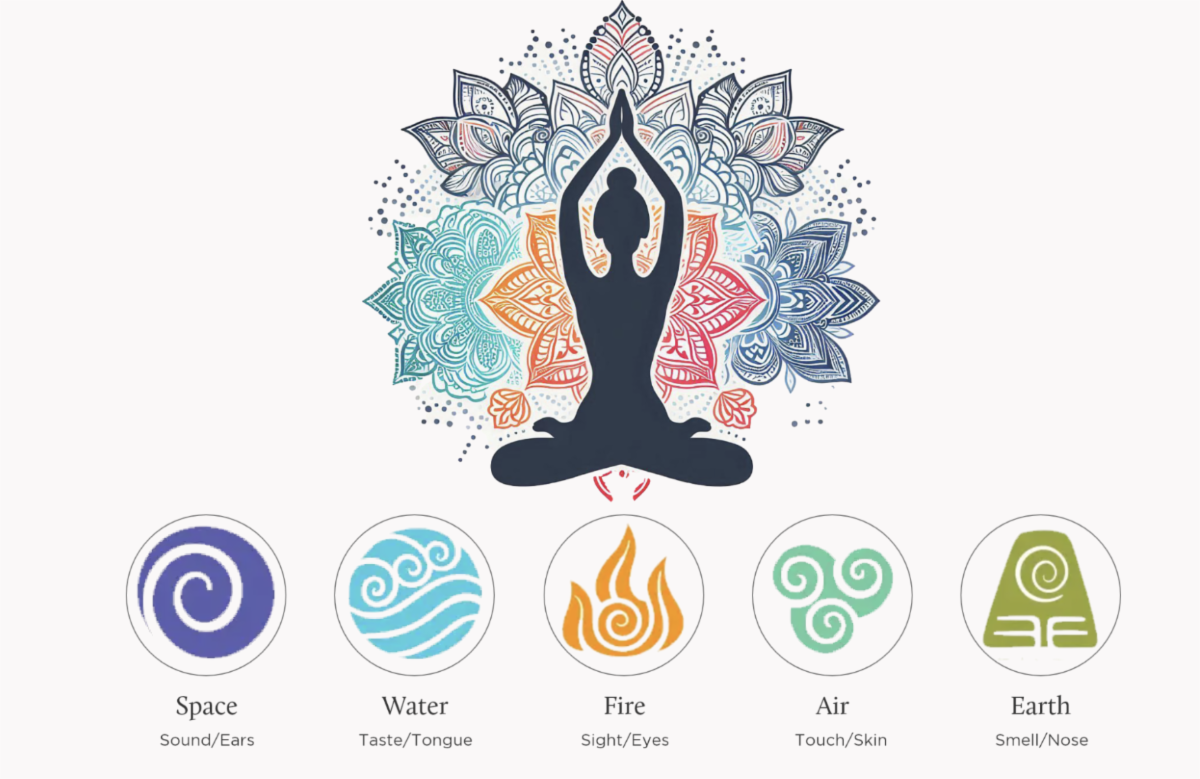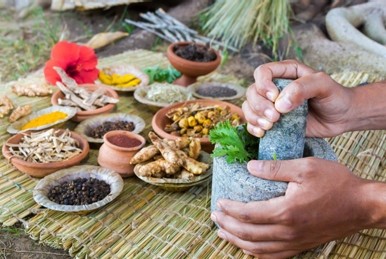Your Nature: Understanding Health Through Ayurveda
October 2025

Ayurveda (pronounced aa·yr·vay·duh) is one of the world’s oldest healing systems, with roots in India that go back over 5,000 years. Even today, it remains a widely practiced form of medicine around the world and is gaining recognition throughout the United States. The word Ayurveda originates from Sanskrit and translates to "the science of life." At its core, Ayurveda is a holistic system of care that recognizes the deep connection between the body, mind, and spirit. Rather than focusing solely on symptoms, it emphasizes prevention, balance, and living in alignment with your nature.

.png)
The Five Elements of Ayurveda
According to Ayurveda, everything in the universe, including our bodies, is made up of five essential elements:
- Earth (Prithvi): stability and structure
- Earth embodies stability, groundedness, and endurance. It represents the qualities of firmness, dependability, and the capacity to hold form, both in the natural world and within our inner foundation.
- Water (Jala): cohesion and flow
- Water expresses fluidity, cohesion, and adaptability. It allows for connection, emotional flow, and the softening of rigidity, offering a sense of nourishment and the ability to move with grace.
- Fire (Agni): transformation and metabolism
- Fire symbolizes transformation, clarity, and illumination. It governs the power to digest experiences, ignite passion, and bring light to understanding, supporting purposeful action and discernment.
- Air (Vayu): movement and circulation
- Air represents motion, lightness, and change. It carries the energy of spontaneity, creativity, and the unseen forces of circulation, constantly shifting and reshaping what it touches.
- Ether (Akasha): space and expansiveness
- Ether is the essence of space, openness, and subtle potential. It is the container for all movement and sound, offering room for awareness, insight, and the unfolding of possibility.
The five elements are much more than physical components with distinctcharacteristics. In Ayurveda, they are understood as universal principles that exist both in nature and within every individual. They are fundamental forces woven through nature and present in every individual, shaping the state of both body and mind.
Together, the elements combine in unique ways to form three primary energies known as doshas. The doshas influence our physical, mental, and emotional functioning. While everyone has all three doshas within them, each person has a natural balance of the three that is uniquely their own. We will explore each of the doshas in more depth in upcoming posts. These include the Vata, Pitta and Kapha.

.png)
Ayurveda and the Nature of Balance
In Ayurveda, health is not defined as the absence of illness but as a state of dynamic balance across all aspects of being. This includes how we eat, sleep, think, move, and respond to stress and change. Your unique constitution, known as prakriti, influences everything from your digestion and energy levels to your emotional patterns and daily rhythms.
Over time, your state of balance can shift due to changes in diet, lifestyle, emotional stress, or seasonal fluctuations. This current state is called vikriti, and it represents how your doshas may be functioning differently than they did in your original constitution. Ayurveda helps identify where these imbalances are happening and encourages gentle, personalized practices to guide you back to your natural state.
Daily Routine: The Importance of Dinacharya
Ayurveda also places great importance on routine. The practice of dinacharya, or daily rhythm, involves aligning your habits with natural cycles to promote harmony and reduce stress. This can include waking up with the sun, drinking warm water first thing in the morning, practicing self-massage, eating meals at regular times, and winding down before bed. These small acts of consistency help the body andmind reset each day, building resilience over time.
The Role of Agni: Your Digestive Fire
One of the key concepts that influences balance is Agni, or digestive fire. Agni governs how well you digest food, absorb nutrients, and eliminate waste. It also helps process and transform everything you take in through your senses, converting impressions into energy and clarity. When agni is strong, you feel energized, clearheaded, and physically light. When agni is weak or overloaded, it can lead to fatigue, foggy thinking, and a buildup of toxins in the body. Supporting digestive health through warm meals, mindful eating, and herbs tailored to your dosha is considered one of the most crucial aspects of maintaining overall wellness.
Listening to Your Body’s Signals
When your doshas are in harmony, you are more likely to feel mentally clear, emotionally steady, and physically well. When imbalance occurs due to poor sleep, emotional stress, dietary choices, or environmental shifts, Ayurveda teaches us to listen to these signals and make conscious adjustments to restore balance. Small, thoughtful changes such as refining your daily schedule, modifying your meals, or spending time in stillness can help bring you back into alignment. The key is learning to tune into your inner nature and respond with care. Ayurveda does not offer a single solution for everyone. Instead, it encourages you to see yourself as a whole and evolving being, where healing is a process rooted in self-awareness, rhythm, and gentle restoration.
.png)
Join the Cause
Wondering how you can help?
Want to help underserved women access critical stress management services?
Together we can build a happier and healthier future for all women